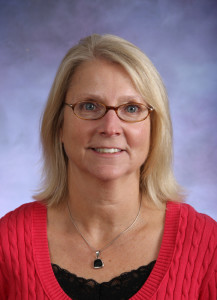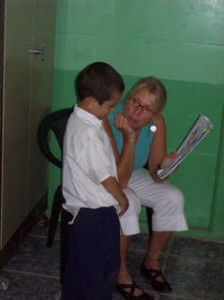 Deb Pitton
Deb Pitton
Professor and Chair in Education
What classes do you regularly teach?
EDU 399, (Student Teaching Seminar) EDU 368 (AVID tutoring /practicum for secondary ed majors) and Supervision of Student Teachers
What’s the best advice about teaching you’ve ever received?
Students learn more from doing than from hearing.
Tell us about your favorite topic or course to teach.
I love working with the student teachers as they are in the field. Watching them take on the role of teacher, seeing them step up to meet their career expectations and being a small part of that growth is very enjoyable!
Describe a favorite in-class activity or assignment.
I think ice breakers/community builders are important for every course – faculty and students need to get to know each other. I like to do a ‘strengths’ exchange (students write down 3 of their strengths, then walk around and try to get another student to guess the strength without saying the specific term). In this way, students recognize their own strengths, see their peers’ strengths, and I also get a chance to see what they bring to the course.
What teaching and learning techniques work best for you? 
I am a big believer in processing and reflecting. After a short amount of content, students need to be given a means (or strategy) for processing the information, and the time to reflect on the learning. I use this format a lot. . . I work to get students engaged, not to have me talking very much.
Tell us something that you’ve learned about yourself from teaching.
That I don’t need to be in charge – students can direct their own learning if I provide a structure for that to occur.
Three words that best describe your teaching style.
STRATEGIES! (I like to use a variety of strategies to engage students in the learning.) REFLECTION! (I always want students to think about their learning = metacognition). RELATIONSHIPS! (learning happens when there is a positive relationship among the students and teachers in a classroom).
What is your teaching philosophy in 8 words or fewer?
My teaching philosophy is: Student centered, focusing on meeting leaner needs.
Tell us about a teaching disaster (or embarrassment) you’ve had.
I had a FTS student for whom English was not her first language. I used a lot of discussion and structured student-lead conversation in class. This student did pretty well in these discussions, however, when I set up an assessment of their discussion based on participation, this student left in tears . . . not able to join in the conversation that was happening at a faster pace than she could process in English. Meeting with her later, I realized the pressure that my ‘grading’ of the discussion put on her . . . and that it almost destroyed her confidence in her ability to share her thoughts in class! (We did an additional small group version of this assessment later that enabled her to show what she knew.) I now offer options for this assessment!!!
 What is something your students would be surprised to learn about you?
What is something your students would be surprised to learn about you?
That I majored in theater as an undergraduate.
What are you currently reading for pleasure?
All the Light they Cannot See ( I love historical novels)
Who would you like to fill out this survey next?
Joel Carlin
The How I Teach series asks Gustavus faculty members to share their thoughts on assignments, course activities, and teaching in general. Most Tuesdays a new Gustavus faculty member will be featured. If you have someone you want to see featured, let us know. Also, we’d love it if you’d answer the questions yourself and send those along with a few pictures to howiteach@gustavus.edu.